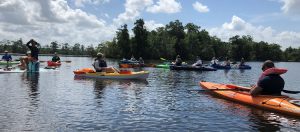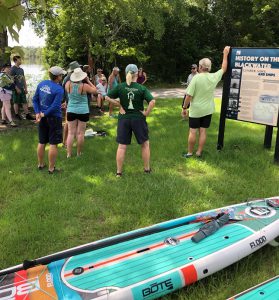Once upon a time, the Blackwater River was a conveyor belt of prosperity. Loggers floated longleaf pine trunks to the mills.
But once the longleafs were all cut, the mills, landings, and structures that supported the industry were abandoned. These structures now whisper like ghosts about a bygone time.
Archaeologist Nicole Grinnan, educator Krystal Brown, and historian Mike Thomin of the University of West Florida (UWF) interpret those whispers. Grinnan and Thomin belong to the Florida Public Archaeology Network, and Brown is a UWF educator at the Arcadia Mill Archaeological Site. They had always translated the whispers into a cultural story, but they sensed there was more to that story in the sheer beauty of the river and its surroundings.
So the interpreters sought out other interpreters— Florida Master Naturalist Instructors Carrie Stevenson, UF/IFAS Extension Escambia County coastal sustainability agent, and Rick O’Connor and Chris Verlinde, Florida Sea Grant agents–to help translate the river’s whispers. They’ve taught hundreds of local residents about the natural history of the Blackwater, Pensacola Bay and other waters through FMNP courses.
An FMNP Coastal Systems course inspired Grinnan, Brown and Thomin to invite classmates and community residents for a floating tour of the Blackwater. People showed up with kayaks, canoes and even standup paddleboards.
People showed up with kayaks, canoes and even standup paddleboards.
The trio had intended to organize a river tour before enrolling in FMNP, but taking the course required them to do something with the knowledge they’d acquired and to do it on a deadline. The history-based kayak tours of the Blackwater River and Pensacola Bay were born.
The tours are more effective than a land-based lecture, the guides insist, because participants experience what they’re learning. While the tours are now on hold, they intend to launch again as soon as they can.
The tour itself may represent an important part of the region’s future economy—ecotourism. Santa Rosa County government recognizes this with its Beaches to Woodlands annual tour, which aims to attract coastal tourists inland to enjoy spectacular hiking, canoeing and bird watching. And, of course, to spend money while they’re at it.
FMNP and ecotours operate on the premise that when locals care about the natural beauty of their community, they will support uses of their natural surroundings that balance ecology and economy.
In fact, Brown argues, the beauty of the waters and a vision for how prosperity could flow from them are what made the Panhandle’s coast attractive to settlers in the first place. That vision requires updating 500 years later.
The river, long dormant as a route for floating timber, could once again spring to economic life through ecotourism.
You can learn more about the FMNP and find courses in your area here. Courses are held year-round and are offered across the state. Keep an eye on the schedule for upcoming classes led by Carrie, Rick, and Chris.
For information on future kayak tours, contact Grinnan at ngrinnan@uwf.edu. You can support local natural history education through the FMNP endowment or discover other ways to participate at www.masternaturalist.ifas.ufl.edu.
Past graduates testify that it got them a better job, inspired them to start a business, connected them in a new way with their grandchildren, improved their teaching, or simply gave them delight that they could identify the mockingbird by its song.
The big lesson that an Extension coastal sustainability agent teaches is that to protect this as a place people want to live or to visit, its ecology and economy have to coexist for 20 years like FMNP, 500 like European-settled Florida, or millennia like the native people whose culture archaeologists like Grinnan study. That’s sustainability.
This article was modified from its initial publication with the Pensacola News Journal. You can find the original article here.
We’re highlighting all things Florida Master Naturalist Program (FMNP) in 2021 as the program marks its 20th anniversary. To learn more about FMNP, view the first blog post here.
 0
0


